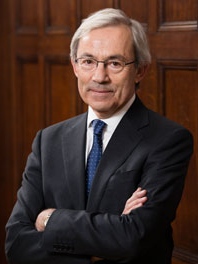Christopher A. Pissarides facts for kids
Quick facts for kids
Christopher Pissarides
|
|
|---|---|

Pissarides in 2014
|
|
| Born | 20 February 1948 Nicosia, British Cyprus
|
| Nationality | Cypriot |
| Citizenship | Cypriot British |
| Institution | London School of Economics 1976–present University of Southampton 1974–76 University of Cyprus 2011–present Hong Kong University of Science and Technology 2013–present |
| Field | Labour economics |
| Alma mater | London School of Economics (PhD) University of Essex (BSc,MSc) |
| Doctoral advisor |
Michio Morishima |
| Contributions | Macroeconomic search and matching theories of unemployment, matching function, structural growth |
| Awards | IZA Prize in Labor Economics (2006) Nobel Memorial Prize in Economic Sciences (2010) |
| Information at IDEAS / RePEc | |
Sir Christopher Antoniou Pissarides is a famous economist from Cyprus. He was born on February 20, 1948. He is a top professor of economics at the London School of Economics in the UK. He also teaches at the University of Cyprus.
His work focuses on how big economies work, especially about jobs and unemployment. In 2010, he won the Nobel Prize in Economics. He shared the prize with Peter Diamond and Dale Mortensen. They won for their ideas about how people find jobs and how businesses find workers.
Contents
Early Life and Education
Christopher Pissarides was born in Nicosia, Cyprus. His family came from a village called Agros. He went to school in Nicosia.
After serving in the Cypriot military, he went to the University of Essex. There, he earned degrees in economics. Later, he studied at the London School of Economics. He earned his PhD in economics, studying how people make choices when they don't have all the information.
Career Highlights
Sir Christopher Pissarides has taught at the London School of Economics since 1976. He is a very important professor there. He also leads a group of economists called the Centre for Macroeconomics. This group includes experts from other top universities and the Bank of England.
He has also taught at other famous universities. These include Harvard University and the University of California, Berkeley.
Helping Cyprus's Economy
In 2012, Cyprus faced a big money problem. Sir Christopher Pissarides became the chairman of the National Economy Council. He helped his home country during this difficult time. He left this role in 2014 to focus on his teaching and research.
Future of Work Research
In 2018, he helped start the Institute for the Future of Work. This group studies how new technologies change jobs and people's working lives. They look at how robots and computers might affect the future of work.
In 2021, he began leading a three-year study. This study, called the Pissarides Review, looks at the future of work and how it affects people's well-being.
Key Economic Ideas
One of Sir Christopher Pissarides' most important ideas is about "search frictions." This means that it takes time and effort for people to find jobs. It also takes time for companies to find the right workers.
He wrote a famous paper called "Job Creation and Job Destruction in the Theory of Unemployment." He wrote this with Dale Mortensen. He also wrote a book called Equilibrium Unemployment Theory. This book explains how unemployment works in an economy.
Awards and Special Honours
Sir Christopher Pissarides has received many awards for his work.
- He became a Fellow of the British Academy in 2002.
- In 2005, he won the IZA Prize in Labor Economics with Dale Mortensen.
- In 2010, he won the Nobel Prize in Economics. He shared it with Dale Mortensen and Peter A. Diamond.
- In 2013, he was made a Knight by the Queen. This means he can use "Sir" before his name. It was for his great contributions to economics.
- He became a member of the Academy of Athens in 2015.
Images for kids
-
Nobel Prize laureates press conference at the KVA, 2010
See also
 In Spanish: Christóforos Pissarídis para niños
In Spanish: Christóforos Pissarídis para niños
 | Dorothy Vaughan |
 | Charles Henry Turner |
 | Hildrus Poindexter |
 | Henry Cecil McBay |


